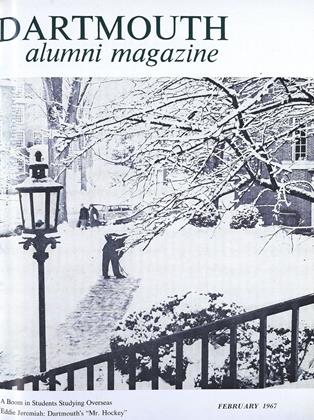Unlike the pulpy Congressional Record which stokes many a fire to a roaring start, Congressional Quarterly publications edited by THOMAS N. SCHROTH '43 receive more reverent treatment.
The businesslike Schroth, whose watchwords are "complete, concise, convenient," is probably Washington's best informed man on Congressional affairs. He heads Congressional Quarterly Service, privately owned news research services sold by subscription.
"CQ reports," according to Dartmouth Public Affairs Professor Gene Lyons, "have come to be relied on by most writers and scholars as the single most important source of information on the activities of the U.S. Congress."
A well-seasoned newsman when he came to CQ in 1955 - he was a reporter for the Washington Bureau of Time and the Boston Bureau of United Press and later managing editor of The Brooklyn Eagle - Schroth expanded the ten-year-old organization, acquired Editorial Research Reports, and began a student service.
In addition to the Quarterly, ERR, and Query services, his 75-member staff produces 52 Weekly Reports, their cumulative 90-day Indexes, and the 200-page Almanac, which distills, reorganizes, and cross-indexes the full year's coverage.
They are also publishers of a semi-annual CQ Guide toCurrent American Government, which is part of their student service, several paperbacks, and the 2000-page book Congress and the Nation, a review of the postwar years 1945-1964, which Professor Lyons calls "a model of organization" and a "priceless tool."
Schroth's introduction to the book reflects his uncommon sense of foresight and hindsight, dominated by a veteran newsman's objectivity and awareness of the contemporary. It contains the best summation of his work philosophy.
He calls the book the substance of news research in a refined form, which he says, "lies somewhere between spot newspaper reporting and scholarly pursuit. It must produce lasting, useful, and recognizable facts - originally organized if not original in themselves - without burying its reader in profundity and esoteric technique."
His job, as he sees it, is to make other people's jobs easier. He strives to make the facts readily available to editors and political commentators and give them more free time for "creative reflection."
The healthily growing number of CQ subscribers who value this convenience includes daily newspapers, trade associations, labor unions and lobbyists, government offices, embassies, about 1700 libraries, and more than half the Members of Congress. Subscribers frequently come into the office for special research, notably Washington correspondents.
Two CQ subscriptions go to Moscow and one to Hong Kong which Schroth thinks is sent on to Peking.
Legislators' responses to CQ polls - on roll-call voting, election year surveys, state-by-state surveys in redistricting and reapportionment, etc. - are virtually 100%.
"CQ has become established to the point that its inquiries receive prompt and substantive attention," Schroth says proudly. "In fact, when important issues come up, many Members call to be sure they are recorded properly."
 View Full Issue
View Full Issue
More From This Issue
Features
-
 Feature
FeatureFaces in the Gallery
MARCH 1978 -
 Feature
FeatureSEASON'S GREENING
December 1989 -
 Cover Story
Cover StoryKarl Barry Sharpless '63
March 1993 -
 Cover Story
Cover StoryThao Dinh Vo '91
March 1993 -
 Feature
FeatureThe Trustees: 15 men and a woman with ultimate authority
October 1979 By Dan Nelson -
 Feature
FeatureInnocence Lost
Mar/Apr 2013 By Matthew Mosk ’92






